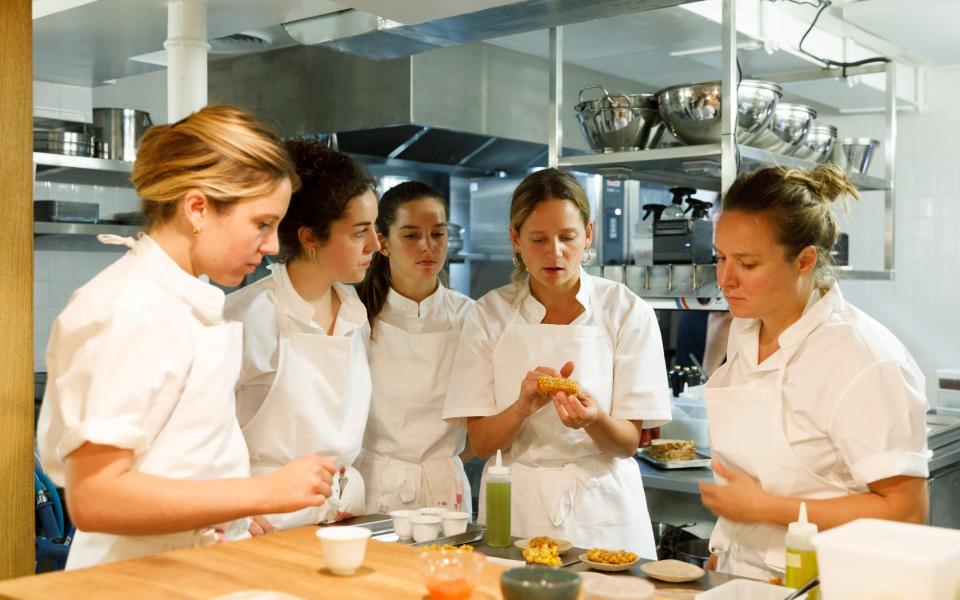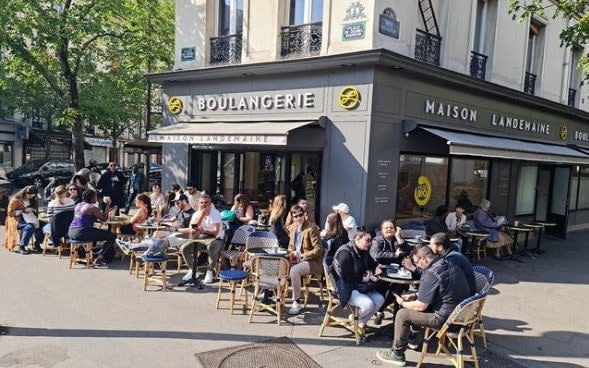From the first time I visited France as a child, I was enchanted. According to my mother I talked about it all the way home, regaling her with facts like, “they speak French there!”. I was determined to find out more about this strange and exotic place. I went on to study the language and the more I learned about the refined and romantic French culture, the more I liked it.
There was just one problem. I was a vegetarian. I grew up with a house full of animals (at one point I think we had 15) so from a very young age it was clear to me that I didn’t want to eat my friends. In the late 90s, when I was seven years old, I vowed to avoid meat forever.
In France, where pork loin sausages are considered a national delicacy (Andouillet), vegetarianism was barely a concept 25 years ago. On trips to Paris during my teenage years, I used my broken French to order the only things I could: egg and chips, or French onion soup, probably made with beef stock anyway.

When I studied abroad in Lyon in 2010, the idea of being meat-free was still foreign to most locals. Waiters were surprised: “Vegetarian?” they exclaimed. “Okay, but you eat duck, oui?”. In the end, I compromised and started eating fish, but only occasionally and in restaurants. It’s a concession I still make today for hotel and restaurant reviews.
I now live in Paris and in recent years I have noticed a definite shift towards more meat free food. These days, most bistros usually have a vegetarian option or two (beyond eggs and chips), for example.
In terms of fine dining, established gastronomic restaurants such as Alain Ducasse’s Epicure and Le Meurice are increasingly moving away from heavy meat options and towards more seasonal plant and fish-based menus. The Michelin Guide described a female-led and plant-based (but not exclusively vegan) restaurant as “the Parisian restaurant of the future”.


Surprisingly, in some ways, it feels like veganism has taken off here in Paris in a way that vegetarianism never quite did, perhaps in part due to social media trends. Recently, the Maison Landemaine bakery made headlines for its exquisite vegan pastries, a firm “heaven” for the locals. Faubourg Daimant, a vegan neo-bistro, is one of the hottest reservations in town (I recommend the radish sashimi).
According to the bible of vegetarian restaurants Happy Cow, the number of vegan restaurants in Paris has increased by more than 25 percent since 2018, and national surveys suggest that meat-free eating is more popular among the younger generation. It is estimated that the number of vegetarians in the total population is between two and five per cent, but as high as 12 per cent among people aged between 18 and 23 years. I recently went back to Lyon to relive my student days and ate at a vegan bistro, Les Mauvaises Herbes, which was packed out on a Friday night.


But, outside the big cities it’s a different story. Data show that the majority of vegetarians and vegans in France do not have children, that they live in the city and are educated: “city fat”, in short. In rural France, meat-eating and animal husbandry are still cornerstones of French identity and the consumption of animal products is seen as a matter of pride by many people across the country.
On a cycling holiday in Normandy with an American friend a few years ago, we stopped at a village restaurant for lunch. Already visible in our lycras, we confirmed our alien status when we asked if they served a vegetarian option. With a quick look the host said: “We can make you… something”. The dish that followed seemed more designed for punishment than sustenance: half a tepid tomato, a complex cooked nutty mushroom and a small chunk of oozing potato dauphinoise.
Why is meat so embedded in the country’s culture? Farming unions, for one, are very powerful. Protests earlier this year were so effective that they extracted tax and regulatory concessions from the Government. Their more powerful liaison is shown every year at the Salon International de l’Agriculture, where the nation’s president is expected to attend and cover the livestock.
And farming lobbyists are fighting against the spread of meat substitutes in supermarkets. Earlier this year, they claimed victory after successfully campaigning to ban the use of words such as “steak” and “mince” on fake meat packaging. Brands like Beyond and Oatly may be slowly getting into widespread use, but lobbying like this certainly doesn’t help. I feel even more at home as a vegetarian in London, and I usually bring back a frozen bag of Quorn sausages. So France is not quite there yet. We’ll see how things are in a few years.